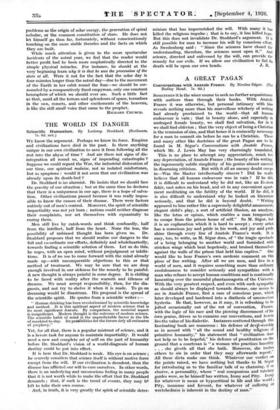THE WORLD IN DANGER
WE know the argument. Perhaps we know its force. Empires and civilizations have died in the past. Is there anything unique in Our own civilization to save it from following all the rest into the abyss of time ? And are there not signs of dis- integration all round us, signs of impending catastrophe ? Suppose we could regard the War, the industrial dislocation of our time, our spiritual Malaise, not as isolated misfortunes, but as symptoms : would it not seem that our civilization was already upon its death-bed ?
Dr. Stoddard is ho alarmist. He insists that we should face the gravity of our situation ; but at the same time he declares that there is a uniqueness in our age, there is a hope of salva- tion. Other civilizations passed because it was really impos- sible to know the causes of their disease. There were factors entirely out of men's control. Moreover, the spirit of scientific impartiality was not yet born ; nations could neither diagnose their complaints, nor set themselves with equanimity to curing them.
Men still live by catch-words and- think confusedly, half from the intellect, half from the heart. - None the less, the possibility of unbiased thought has been given us. Dr. Stoddard proposes that we should realize our dangers to the full and co-ordinate our efforts, definitely and wholeheartedly, towards finding a scientific solution of them. Let us do this, he urges, with an open mind, without prejudgrnent or inhibi- tions. It is of no use to Come forward with the mind already made up—with unconquerable objections to this or that method of treatment. We may be sure that we are deep enough involved in our sieknesi for the remedy to be painful. A new thought is always painful in some degree. It is chilling to be faced with reality after the warmth and idleness of dreams. We must accept responsibility, then, for the dia- gnosis, and not try to shelve it when it is made. To go on dreaming would be disastrous. His proposal is the spread of the scientific spirit. He quotes from a scientific writer :—
"Human thinking has beenrevolutionized-by scientific knowledge and method. It is this spiritual aspect of modern science that is its most significant feature. By comparison, the material aspect is insignificant. Modern thought is the outcome of modern science. The scientific habit of mind is the unpredictable factor in the life of mankind to-day. Its possibilities for the future defy all estimates Of prophecy."
Yet, for all that, there is a popular mistrust of science, and it is a heroic task for anyone to maintain impartiality. It would need a new and complete act of will on the part of humanity
before Dr. Stoddard's vision of a world-diagnosis of human destiny could be put into effect.
• It is here that Dr. Stoddard is weak. His eye is on science ; he scarcely considers that science itself is without motive force except from the will. If our civilization is decadent, then the disease has afflicted our will to cure ourselves. In other words, there is an underlying and unconscious feeling in many people that it is trot worth while to make the effort that Dr. Stoddard demands ; that, if such is the trend of events, they may be ltft to take their own course.
- And, in truth, it is very greatly the spirit of scientific deter- minism that has impoverished the will. With many it has killed the religious impulse ; that is to say, it has killed hope. But this does not invalidate Dr. Stoddard's argument. It is still possible for man to increase his will by conscious effort, As Swedenborg said : "Since the sciences have closed tln understanding, therefore, the sciences must open it" Axd science, directed and enlivened by the will, can provide the remedy for our evils. If we allow our civilization to fail it
death will be upon our own heads. J. H.


































 Previous page
Previous page